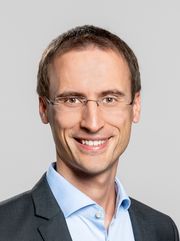Andreas Reiserer

Fellowship
Rudolf Mößbauer Tenure Track
Appointment
2023
Institution
TUM School of Natural Sciences
Department
Physics
Focus Group
Quantum Networks
Short CV
Andreas Reiserer studied physics at the University of Würzburg and the Max-Planck-Institute of Biophysical Chemistry in Göttingen. He then did a PhD at the Max-Planck-Institute of Quantum Optics in Garching. In 2014, he moved to QuTech and the Kavli Institute of Nanosciences, Delft, The Netherlands. After 2016, he has been leading an Otto-Hahn Research Group at the Max-Planck-Institute of Quantum Optics. He is a Professor of Quantum Networks at TU Munich since 2022.
Selected Awards
- 2018, Starting Grant of the European Research Council
- 2016, Paul Ehrenfest Best Paper Award for Quantum Foundations, awarded by IQOQI (Vienna)
- 2015, Otto Hahn Award of the Max-Planck-Society for outstanding achievements during PhD research
Research Interests
Quantum networks will allow their users to implement tasks and communicate in ways that are not possible using present-day technology. As an example, they will enhance the computational power of quantum computers and allow users to safely connect to them. In addition, quantum networks enable the connection of distributed quantum sensors with unprecedented accuracy. In this context, the Professorship on Quantum Networks explores novel hardware platforms, in which stationary quantum systems are connected and entangled by the exchange of photons. In particular, the group investigates erbium dopants in silicon, which offer a unique potential for future devices that can be manufactured using established technologies of the semiconductor industry.
Selected Publications
- Purcell enhancement of single-photon emitters in silicon. A. Gritsch, A. Ulanowski, and A. Reiserer, Optica 10, 783–789 (2023).
- Cavity-enhanced quantum network nodes. A. Reiserer; Rev. Mod. Phys. 94, 041003 (2022).
- Spectral multiplexing of telecom emitters with stable transition frequency. A. Ulanowski, B. Merkel, A. Reiserer, Science Advances 8, eabo4538 (2022).
- Narrow Optical Transitions in Erbium-Implanted Silicon Waveguides. A. Gritsch, L. Weiss, J. Früh, S. Rinner, A. Reiserer, 1. A. Gritsch, L. Weiss, J. Früh, S. Rinner, A. Reiserer, Phys. Rev. X. 12, 041009 (2022).
- Silicon-on-Insulator for Optically Interfaced Quantum Emitters. Y. Liu, S. Rinner, T. Remmele, O. Ernst, A. Reiserer, T. Boeck; Journal of Crystal Growth 126733 (2022).
- Dynamical decoupling of spin ensembles with strong anisotropic interactions. B. Merkel*, P. Cova Fariña*, A. Reiserer; Phys. Rev. Lett. 127, 030501 (2021).
- Erbium Dopants in Nanophotonic Silicon Waveguides. L. Weiss*, A. Gritsch*, B. Merkel, A. Reiserer; Optica 8(1), 40 (2021).
- Coherent control in the ground and optically excited states of an ensemble of erbium dopants. P. Cova Fariña*, B. Merkel*, N. Herrera Valencia, P. Yu, A. Ulanowski, A. Reiserer; Phys. Rev. Applied 15, 064028 (2021).
- Coherent and Purcell-Enhanced Emission from Erbium Dopants in a Cryogenic High-Q Resonator. B. Merkel, A. Ulanowski, and A. Reiserer; Phys. Rev. X 10, 041025 (2020).
- Entanglement distillation between solid-state quantum network nodes. N. Kalb*, A. Reiserer*, P. C. Humphreys*, J. J. W. Bakermans, S. J. Kamerling, N. H. Nickerson, S. C. Benjamin, D. J. Twitchen, M. Markham, R. Hanson; Science 356, 928 (2017).